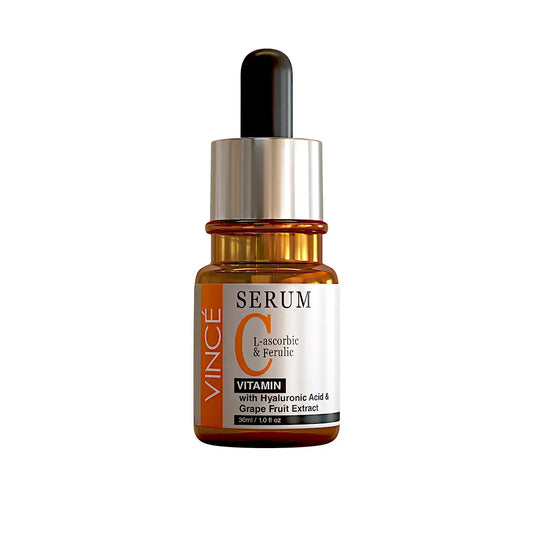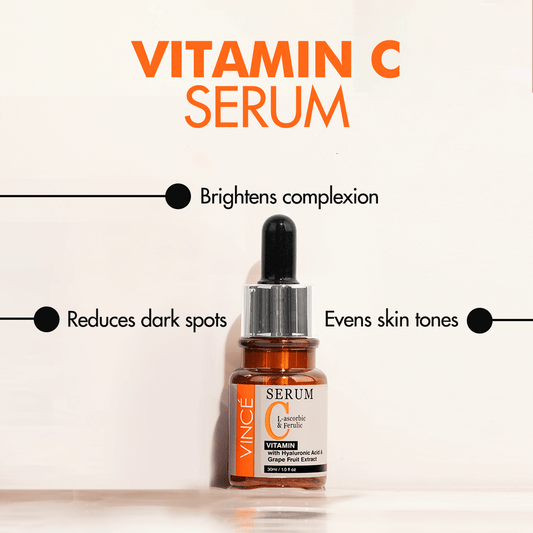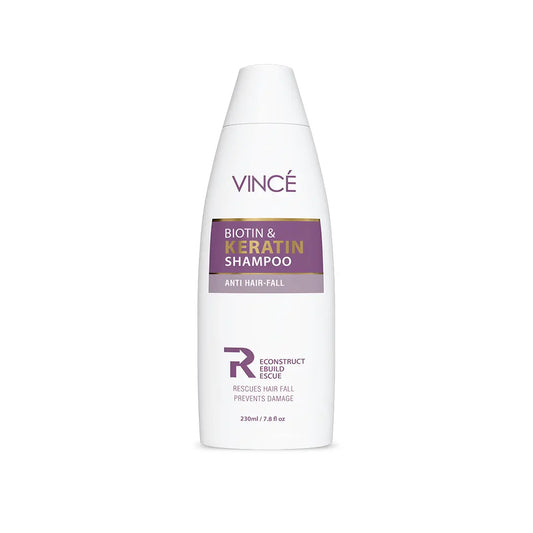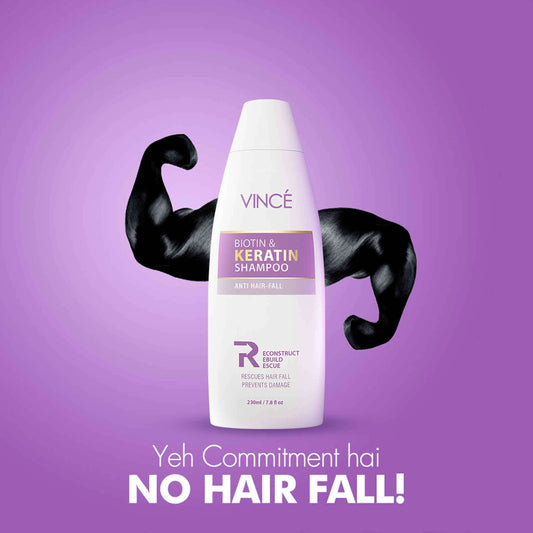Vitamin C Serum vs Retinol: Which is Better?

Skincare is not just a routine to follow: it’s an investment in your skin’s health and appearance. From the moment you wake up to when you hit the pillow, your skin endures greatly due to physical and climatic changes. Most people turn to potent skincare ingredients to combat these challenges and attain a radiant complexion. Two such powerhouses are vitamin C serum vs retinol.
While both offer remarkable benefits, which one is truly better for your skin? A question asked many times. Both have their unique strengths: Vitamin C is known for brightening and protecting the skin, whereas retinol tackles fine lines and acne. Let’s discover which one is the perfect match for your skin.
Retinol Serum vs Vitamin C Serum
Retinol serum is a concentrated skincare product that provides the benefits of retinol directly to your skin. While vitamin C serum is a powerful skincare product, useful for brightening, and protecting the skin. Let’s look into the details to determine which is best for your skin in retinol vs vitamin C serum.
What is Retinol Serum?
A retinol serum is a skincare product that offers a concentrated dose of retinol directly to the skin. The active ingredient, retinol, is a derivative of vitamin A, renowned for its ability to stimulate cell turnover, boost collagen production, and improve overall skin texture.

The Benefits of Retinol Serum
Retinol serums are formulated to target a variety of skin concerns. A detailed account is given below.
1. Anti-Aging Skincare
Retinol serum is a potent anti-aging skincare product that not only fights aging signs but improves the skin texture as well. The stimulation process of collagen (the protein, related to structure and elasticity, which gets slower to reflect aging) production helps reduce fine lines and wrinkles and improves the firmness of skin resulting in a youthful appearance.

2. Treats Hyperpigmentation
Retinol is also useful in hyperpigmentation treatment because its capacity to accelerate cell turnover helps to shed pigmented skin cells more rapidly while reducing melanin production, the pigment responsible for the color of skin.
3. Treats Acne
The debate over vitamin C vs retinol for acne favors retinol serum due to its formulated properties for acne treatment. The exfoliation of dead cells clears the skin, and the prevention of clogging pores effectively reduces whiteheads and blackheads. It also balances sebum production which reduces oiliness and breakouts.
Important Link: Vitamin C Serum vs Niacinamide Serum
4. Reduces Fine Lines and Wrinkles
Retinol is effective for fine lines and wrinkle reduction as it speeds up collagen production, resulting in the reduction of the appearance of fine lines and wrinkles. The boost in cell turnover also facilitates in achieving smooth, younger-looking, and firm skin by removing dead cells and helps in the regeneration of new healthy cells. The improved skin texture also minimizes the prominence of wrinkles.
5. Improves Skin Texture
Its ability to address major skin concerns such as signs of aging, fine lines and wrinkles, acne, and hyperpigmentation, ultimately improves the skin texture and tone. So its multidimensional feature for treating important skin issues, enhances overall skin appearance, texture, and tone by making it smooth and clear. Vince Retinol Night Serum with 0.2% strength is effective for deep wrinkles, fine lines, dark spots, and discoloration, with anti-aging properties.

How to Use It?
Retinol is a strong ingredient, so doing a patch test is always recommended for every new skincare product. The following steps are important to get the desired results.
- Cleanse your face and pat dry it.
- Apply retinol serum by using 4-5 drops evenly to your face by avoiding the eye area.
- Moisturizer is the subsequent product to be used to keep the face hydrated.
- Retinol makes your skin sun sensitive, so the regular use of suitable sunscreen is mandatory.
- Start using retinol slowly with low strength once or twice a week to allow your skin to adjust, before making it daily use. Retinol for sensitive skin should be chosen carefully as it can be irritating initially.
- Ideal to use at night time as it increases skin sensitivity to the sun.
Important Link: Top 5 Main Benefits of Retinol Serum For Skin
What is Vitamin C Serum?
Vitamin C serum is also a strong skincare product that contains a high concentration of vitamin C, scientifically known as ascorbic acid. It’s a powerful antioxidant that helps to protect the skin from damage caused by free radicals, the unstable molecules that can harm skin cells and contribute to aging. Additionally, it brightens the skin, stimulates collagen production, provides UV protection, and even outs the skin tone.

The Benefits of Vitamin C Serum
The targeted skin concerns of vitamin C serum in terms of formulation are listed below.
1. Protects Against Environmental Damage
Vitamin C is a powerful antioxidant that plays a crucial role in protecting the skin from damage. It helps to neutralize the free radicals (the unstable molecules that can damage skin cells produced naturally by the body or environmental factors such as pollution, UV radiations) through the process of oxidation where vitamin C acts as an electron donor to prevent them from causing harm to skin cells. Free radicals can also cause chain reactions which vitamin C helps to prevent.
2. Brightened and Even Toned Skin
Vitamin C serum can significantly contribute to brightening the complexion by restricting melanin (the pigment that gives skin its color) production which causes discoloration, promoting cell turnover to remove dead skin cells and reveal fresher ones, and reducing inflammation which results in a calm, and improved complexion.
Important Link: How to Use Vitamin C in Your Daily Skincare Routine
3. Reduces Dark Spots
It helps to prevent the formation of new dark spots by restricting melanin production, a pigment known for giving color to the skin. It is antioxidant protection and brightening ability facilitate in preventing dark spots, and acne scars and lightening the existing ones. While vitamin C serum effectively reduces the appearance of dark spots, the results may vary depending on the individual skin type and the severity of pigmentation.
Retinol vs Vitamin C For Dark Spots
Both products can effectively treat the dark spots by working differently. For mild symptoms of dark spots, Vince Vitamin C Serum can be a smart choice, and for severe conditions, retinol is effective.
1. Reduces Signs of Aging
Vitamin C works as an anti-aging skincare product along with other benefits. Vitamin C serum is directly involved in the formation of collagen, a protein associated with structure and elasticity of the skin.
By boosting collagen and protecting skin against damage, it facilitates reducing signs of aging and the appearance of fine lines and wrinkles. So, the skin appears to be younger as the process of aging slows down due to vitamin C serum.
2. Improved Skin Texture
The regular use of vitamin C not only helps to address skin concerns but improves the skin texture as well. As consistent application of it, reduces aging signs, protects from environmental damage, and fades away dark spots and acne scars, the ultimate results appear in the form of improved skin texture and tone.
The clear, fresh, youthful, and radiant glow is reflected on the skin. So, incorporate a good vitamin C serum to achieve healthy skin as Vince Vitamin C Serum is the ideal choice for addressing major skin concerns gently.
How to Use It?
The basic guide on how to incorporate vitamin C serum into your skincare routine is given below to attain the best and most effective results.
- Cleansing the face is the first step and pat it dry.
- Apply a toner if it's part of your skincare routine.
- Apply serum by taking a few drops and gently massaging it into your skin.
- Then, seal the goodness with a suitable moisturizer.
- Follow up with a suitable, broad-spectrum sunscreen to add a protective layer on your skin.
- The best time to use it is in the morning.
Conclusion
The ultimate choice between retinol and vitamin C serum depends on specific skin concerns and goals. Both are amazing skincare products and offer remarkable benefits for the skin.
Many experts recommend incorporating both into your skincare routine to generate optimal outcomes. If you are prioritizing brightening along with protection, vitamin C might be your pick.
But if you are looking for anti-aging and improved texture of the skin, retinol could be the star of your skincare show.
Important Link: Vitamin C Serum vs Hyaluronic Acid Serum
Frequently Asked Questions (FAQs)
Q1. Which is better vitamin C or retinol?
Both are powerful ingredients with distinct benefits. Vitamin C is a potent antioxidant that brightens and protects, whereas retinol is a cell-renewing powerhouse that tackles wrinkles and texture. The ideal choice depends on your specific skin concern. Vitamin C is best for immediate effects but for long-term anti-aging outcomes, retinol might be your priority.
Q2. Can you use vitamin C serum and retinol together?
Yes, vitamin C and retinol can be used together, but not at the same time as applying them together can interfere with the efficacy of both products, and can increase the risk of irritation resulting in redness, dryness, or peeling. The best approach is to use them at different times of the day: vitamin C in the morning and retinol at night.
Q3. Do you apply vitamin C or retinol first?
Generally, it is recommended to apply Vitamin C before Retinol. Vitamin C is more stable than retinol, so it’s better to apply it first to protect your skin from potential degradation. Being an antioxidant, vitamin C is ideal for morning use to get protection from environmental harm, while retinol is often used at night because it can increase sensitivity to the sun.
Q4. Is vitamin C or retinol better for hyperpigmentation?
Both skincare products are effective for hyperpigmentation, but they work differently. Vitamin C helps to restrict the production of melanin, and its antioxidant protection provides additional support. Whereas, retinol accelerates cell turnover, and exfoliates dead skin cells, helping to fade dark spots over time. For mild hyperpigmentation, vitamin C might be a good starting point due to its gentle nature. For stubborn dark spots, retinol can be effective.



